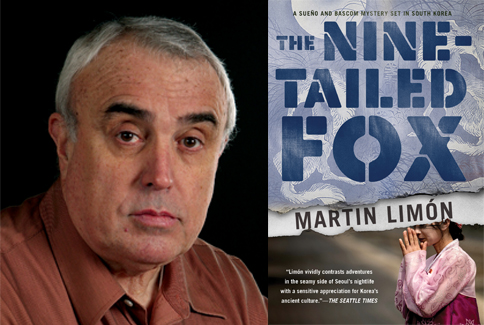
“Imbued with affecting characters, a morally knotty storyline, and a last chapter that just plain stuns.” –Maureen Corrigan, NPR.org
Soho Crime author Martin Limón’s thrilling series set in post-war Korea stars Sergeant George Sueño and his partner, Ernie Bascom. The duo investigates crimes in which US Army personnel might have been involved, and do what they can to soften everyone’s bad opinion of Americans in Korea, all while soaking up the country’s rich and multilayered culture.
The Nine-Tailed Fox is the thirteenth book in the Sueño and Bascom Investigations, and came out in paperback this month. To celebrate, we are having a weekend sale.
Now through Sunday, when you purchase the paperback or ebook version of The Nine-Tailed Fox, we will include a second free Martin Limón paperback free of charge!
All you have to do is choose which paperback you would like from the series, and use promo code: #LimonWeekend at the end of the transaction process.
More about The Nine-Tailed Fox:
Three American GIs have gone missing in different South Korean cities. 8th Army CID agents George Sueño and Ernie Bascom find one thread connecting the disappearances: a beautiful woman locally rumored to be a gumiho, an ancient legendary creature in disguise. But George suspects that there’s no magic to this woman, and that she’s a highly skilled kidnapper who knows how to cover her tracks. He soon realizes he may have to risk his own life to track down his fellow countrymen.
*Use promo code #LimonWeekend to claim your free paperback!*
“Clever plotting and superior characterizations lift this suspenseful, atmospheric installment.” –Publishers Weekly, Starred Review
Chapter 1
Brigadier General Hubert N. Frankenton, Chief of Staff of the 8th United States Army, frowned as he stared at a wall-sized map of the Korean Peninsula. After pondering it for a minute, he slapped his pointer at a red dot and said, “The first soldier disappeared here, from Camp Kyle near Uijongbu.” He turned toward his aide, a captain, and asked,
“What was his name?”
She checked her notes. “Werkowski.” She then recited his rank and unit as everyone at the conference table dutifully scribbled it down.
“Quartermaster unit,” the Chief of Staff murmured, as if to himself. “The next disappearance,” he continued, “happened here, at a supply-and-maintenance outfit of the Nineteenth Support Group.”
He pointed to an area closer to the Yellow Sea: a compound known as ASCOM, the Army Support Command near Bupyong.
“And the most recent disappearance happened way the hell down south in the village just outside of Hialeah Compound, near Pusan.” The largest port city in South Korea, about two hundred miles from Seoul.
The Chief of Staff pulled up his khaki pants and paced the room. The only person with the bravery—or rank—to venture a comment was my boss, Colonel Walter P. Brace, Provost Marshal of the 8th United States Army.
“These disappearances,” Colonel Brace said, clearing his throat and lowering the timbre of his voice, “might not be related, sir. It’s possible these fellows have gone AWOL and will turn up eventually, drunk and broke and begging to be taken back.”
General Frankenton nodded his head, still pacing, his hands clasped behind his back.
“It’s possible, Walt,” he agreed. “I hope that’s what happened. But none of the facts in these cases jibe with your typical AWOL. None of the soldiers involved took anything with them. Their overnight bags were found in their lockers. Only one of them disappeared just after end-of-month payday, when most soldiers go AWOL. According to Data Processing, none of them have used their ration control plates to buy anything out of the PX since they left, which they would normally do in order to raise a little money on the black market.” He waved his pointer in a circle in the air as if it were a divining rod. “And most importantly, the shrinks tell me none of the missing men appeared to be under any particular stress from personal problems or an important upcoming inspection. In fact, in all three cases, these men’s commanders couldn’t say enough good things about them. Ideal troops, they were called. Reliable and dedicated to their units. Top soldiers. And yet they disappeared without a trace, and apparently with no advance planning.”
The general sat down heavily at the head of the table. “And I don’t need to tell you,” he said with a sigh, “that we’re catching holy hell from their families and their congressmen back home.”
After a respectful silence, one of the officers ventured an inquiry. “Do we suspect North Korean activity?”
General Frankenton winced.
In the more than twenty years since the Korean War, the warring nation had been divided along the DMZ; the Communist North Korean regime on one side and the authoritarian Park Chung-hee military regime on the other. Just thirty miles north of Seoul, 700,000 Red soldiers waited impatiently for the order to invade, just as they did in 1950. On the southern side, 450,000 Republic of Korea soldiers stood guard, resolutely prepared to repel any foolhardy aggression. Meanwhile, North Korean commando units made the occasional clandestine foray into South Korea, spreading death to the unwary, and spy activity was a regular feature of life in this intense corner of the Cold War.
The Chief of Staff pondered the question about North Korea, lacing his fingers in front of his belly. “It’s always possible,” he said. “But North Korean spies usually go after well-thought-out targets. Ones with access to classified information, most often. These three fellows, while good soldiers, worked in nothing of a sensitive nature and had no hand in anything the Communists are likely to want.”
The officers lining the mahogany conference table grew quiet. The Chief of Staff stood again and paced the length of the room, though his highly polished low quarters made no sound on the plush wall-to-wall carpet.
My name is George Sueño. I’m an agent for the Criminal Investigation Division of the 8th United States Army, stationed at 8th Army headquarters in Seoul. My investigative partner Ernie Bascom and I sat in two straight-backed chairs against the outer wall of the conference room. Why we’d been ordered to stand by, I wasn’t quite sure. These classified briefings were usually for brass only, not lower-level enlisted scum like us. Ernie was more nervous than I was. He avoided headquarters when he could, and suspected that we were about to be railroaded into something we wouldn’t like.
The Chief of Staff stopped pacing and seemed to jump out of his reverie. His eyes searched the room and eventually focused on me.
“Agent Sueño,” he said, pronouncing my name correctly, with the “ñ” like the “ny” in “canyon.”
“Yes, sir,” I said, sitting up straighter.
“You know the ville,” he stated—the GI villages, red-light districts packed with bars and nightclubs and whorehouses, that sat outside each of the over fifty US military compounds in South Korea. “Very well, from what your boss tells me.” He glanced over at Colonel Brace. “What do you think would make young troopers like these disappear without a trace?”
All heads at the conference table turned to stare at me. Ernie fidgeted in his seat.
“A woman,” I replied.
The conference room broke into laughter. Smiling, the Chief of Staff turned away. After the laughter died down, he turned back to me and said, “I think you’re right. I think that should be the first avenue of approach. I’m told you and your partner here, Agent Bascom, are both pretty good at blending in out in the ville.”
Ernie clicked his ginseng gum but didn’t answer.
“We manage, sir,” I replied.
“More than manage,” the Chief of Staff said. “You can speak, read, and write Korean, and your partner here seems to have a knack for communing with the underclass of whatever group you encounter. That’s why I invited you two here.” He hiked up his pants again. “From what I’m told, you’re the two best damn investigators we have in-country.”
I didn’t answer.
The conference room had gone deathly silent, every head still turned toward us. Some of them with blank, wide-eyed stares, waiting greedily for me to make a fool of myself. Others with frowns, annoyance that someone so low in the hierarchy should be anointed with the Chief of Staff’s attention. There are few things officers hate more than enlisted men being praised above them, and on the rare occasion when it happens, they plot their revenge carefully. I was more than just comic relief. I was a pig being fattened for a luau.
Oblivious to the pique bubbling about him, the Chief of Staff swiveled to study the map, then turned abruptly back to me. “Given what we know so far, Agent Sueño, where would you start your investigation?”
“Pusan,” I said without hesitation.
“Why?”
“The disappearance from Hialeah Compound was the most recent, sir. Just two days ago. We’re most likely to find people there who saw something and, more importantly, still remember what they saw.”
The Chief of Staff nodded. “How much time do you need to get down there?” he asked.
“If you give us a chopper,” I told him, “we can leave now.”
He grinned slightly at the answer, then said, “Better change out of those monkey suits,” nodding at our dress-green uniforms.
“Yes, sir.”
He turned to his assistant, the female captain. “Call the One-Oh-Five Aviation Unit and schedule these two men a chopper. I want them in Pusan before noon chow.”
“Yes, sir,” she said, rising to her feet. A nice-looking woman with reddish-brown hair knotted tightly atop her head and a name tag that said retzleff. “Come with me.”
Ernie and I followed her out of the conference room. Without being told, another of the officers had stood and was handing out sheaves of paperwork. Each thin stack was topped with a light blue cover sheet stamped top secret.
All the eyes that had been studying us before now completely ignored us. Behind us, the door shut silently.
In Captain Retzleff’s office, we were issued for official use only reports that had been generated by 8th Army Personnel, containing the backgrounds of the three missing GIs as well as the MP blotter reports of their disappearances. She lifted her telephone.
“How soon can you be at the helipad?” she asked.
“Thirty minutes,” I told her.
She started to dial. After a brief conversation, she hung up the phone and turned to us. “General Frankenton may seem calm, but in reality, he’s very upset. Soldiers don’t just disappear like this. Not in his command.”
“Not until now,” Ernie said.
Her eyes narrowed. “Everyone says you’re a wise guy, Bascom.”
“Everyone’s right,” Ernie replied.
“The only question is,” she continued, “can you find the three missing men?”
“If anybody can find them, me and my partner can.”
Generous lips turned up in a half-smile. “Do you agree?”
“Guaranteed,” I replied.
“You two are pretty cocksure of yourselves, aren’t you?”
“We haven’t failed yet,” Ernie said, exaggerating perhaps a tad.
The grin faded, and Captain Retzleff paused. In the end, she decided to say nothing except: “You’re dismissed.” She turned her back on us and strode toward the conference room. As he watched her leave, Ernie clicked his ginseng gum more rapidly than usual.
We exited through the main doors and hurried toward the jeep.
“Why’d you mess with her?” I asked.
Ernie shrugged. “Those officers in the conference room were laughing at us. I wanted to show her that we couldn’t be pushed around. Besides, I wanted to spend more time looking at her.”
“You’re going to get your low-ranking butt in trouble one of these days.”
“She’d be worth it.”
Fraternization between officers and enlisted personnel was a court-martial offense—a fact that I knew only too well, given my most recent relationship with military psychiatrist Leah Prevault. Ernie hopped into the jeep and switched on the ignition. I slid into the passenger seat.
“Colonel Brace ain’t going to like it,” Ernie said, “having the Chief of Staff assign two of his men to an investigation.”
“Why not?”
Ernie turned and studied me. “Are you dingy dingy? It makes him look incompetent, like the Chief of Staff has to reach down and do his job for him.”
I shrugged. “I think you’re making too much of it.”
“You’ll see.” He backed the jeep out of its parking spot. Then he asked, “Why’d you pick Pusan? That bit about finding witnesses to the last disappearance was a bunch of bull.”
“Simple,” I told him. “Pusan is farthest from the flagpole.”
As we drove past the two-story brick 8th Army headquarters building, off to our left sat a seventy-five-millimeter howitzer used for ceremonial purposes and three flagpoles with the banners of the United States, the Republic of Korea, and the United Nations Command waving against an overcast backdrop.
“You should’ve asked for per diem,” Ernie said.
“I can’t think of everything. Why didn’t you speak up?”
“Too many honchos.”
“You afraid?” I asked.
“Very. Afraid I’ll strangle one of them.” Ernie’s fingers tightened on the steering wheel. “We’ve got to find these guys.”
“Why?”
“To prove we’re not the bozos the brass thinks we are.”
We drove to the barracks. Twenty minutes later, in our running-the-ville outfits—blue jeans, sneakers, sports shirts with a collar, and nylon jackets with fire-breathing dragons embroidered on the back—we were on our way to the 105th Aviation Unit helipad. The chopper was already there when we arrived, engine whining, enormous metal blades swirling in an ever-accelerating gyre.
We climbed aboard.
The crew chief shouted something I couldn’t hear, fitted headsets over our ears, and strapped us into the canvas seats. When he was satisfied that we were secure, he slid the large metal door shut and said something into the small mic in front of his mouth. The blades above revved faster, the chopper shuddered, and with a great, whooshing insult to gravity, the giant whirlybird lifted into an endless gray sky.

